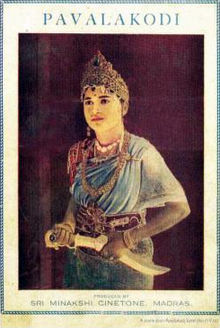Pavalakkodi
| Pavalakkodi | |
|---|---|
 Poster | |
| Directed by | K. Subramanyam |
| Produced by | S. M. Lakshmana Chettiar |
| Starring | M. K. Thyagaraja Bhagavathar S. D. Subbulakshmi R. S. Sundarambal S. S. Mani Bhagavathar |
| Music by | Papanasam Sivan |
Release date |
|
| Language | Tamil |
Pavalakkodi is a 1934 Tamil language film starring M. K. Thyagaraja Bhagavathar and directed by K. Subramanyam. It was the first film for both of them.[1][2][3][4][5][6][7] The film's music was composed by Papanasam Sivan.[8]
Production[]

Pavalakkodi (lit. The Coral Queen) was originally a successful stage play acted out by a troupe of artists composed of Thyagaraja Bhagavathar, Mani Bhagavathar and S. D. Subbulakshmi. The troupe toured all over Tamil Nadu, Ceylon, Malaya and Singapore staging the play.[9] S. M. Lakshmana Chettiar (Lena), a prominent businessman, R. M. Alagappa Chettiar and K. Subramanyam watched it at Karaikudi.[10] Highly impressed by the play they decided to produce a film based on it. The lead actors, M. K. Thyagaraja Bhagavathar and S. D. Subbulakshmi were hired for Rs. 4,000 and Rs. 2,500 respectively. This was the first film for both of them.[7] This film was the first for Subramanyam as director. A vacant land (present day campus of Dr. MGR Janaki College of Arts and Science for Women) in Adyar was chosen for filming. Subramanyam established his studio at the spot and called it Meenakshi Cinetones. Filming was done outdoors using sunlight. Scenes were shot continuously when the sun was shining brightly and breaks were called when it became cloudy. Whenever the cloud cover broke, cast and crew rushed to resume filming abandoning their food packets. The abandoned food attracted a lot of crows from the wooded Adyar surroundings. The cawing of crows was a nuisance to recording (songs and dialogues were recorded directly on the spot). Subramanyam hired an Anglo Indian named Joe to fire his rifle in the air and shoo away the crows. Joe was credited in the film credits as "Crow Shooter". The studio did not have its own lab and scenes were shot without knowing how they would turn out. All the post production work was done at Bombay.[1]
Plot[]
Pavalakkodi tells the mythical love story of Arjuna (Thyagaraja Bhagavathar) and Pavalakkodi (S. D. Subbulakshmi), the princess of Coral Island.
Cast[]
- M. K. Thyagaraja Bhagavathar as Arjunan
- R. S. Sundarambal as Subhadra
- S. S. Mani Bhagavathar as Krishnan
- S. D. Subbulakshmi as Pavalakodi
- K. K. Parvathi Bai as Alli
Soundtrack[]
The film had 50 songs,[3] of which 22 were sung by M. K. Thyagaraja Bhagavathar.[11] Some of the popular songs from the movie are:
- Somasekara (Raga: Karaharapriya)
- Kanna Kariyamugil Vanna (Raga: Bhairavi)
- Vanithaikul Uyirvaana
- Munnam oru Sanyasi Vadivaaki
Reception[]
Pavalakkodi was a box office hit and ran for nine months.[10] It was also one of the earliest commercially successful Tamil films. On the successful completion of the film, Subramanyam married S. D. Subbulakshmi as his second wife.[10] Pavalakkodi set the stage for M. K. Thyagaraja Bhagavathar's eventful career as the first superstar of Tamil Cinema. The single remaining print of this film has been preserved at National Film Archives, Pune.[1][3]
References[]
- ^ a b c Guy, Randor (20 February 2012). "Pavalakodi 1934". The Hindu. Archived from the original on 22 September 2017. Retrieved 21 September 2017.
- ^ Baskaran, S. Theodore (1996). The eye of the serpent: an introduction to Tamil cinema. Chennai: East West Books. p. 199.
- ^ a b c Thoraval, Yves (2000). The cinemas of India. India: Macmillan. p. 37. ISBN 978-0-333-93410-4.
- ^ Rajadhyaksha, Ashish; Willemen, Paul (1994). Encyclopaedia of Indian cinema. British Film Institute. pp. 56, 206. ISBN 978-0-85170-455-5.
- ^ Arandhai Narayanan (2008). Arambakala Tamil Cinema (1931-41) (in Tamil). Chennai: Vijaya Publications. p. 22.
- ^ Film News Anandan (2004). Sadhanaigal padaitha Tamil Thiraipada Varalaaru (in Tamil). Chennai: Sivagami Publications. pp. 28:2.
- ^ a b Film News Anandan. "Directors who made a difference in the Tamil Cinema World". Indolink.com. Archived from the original on 24 September 2015. Retrieved 12 October 2008.
- ^ "The phenomenon lives forever". The Hindu. 22 September 2000. Archived from the original on 28 September 2008. Retrieved 12 September 2008.CS1 maint: unfit URL (link)
- ^ Lal, Ananda (2004). The Oxford companion to Indian theatre. Oxford University Press. p. 50. ISBN 978-0-19-564446-3.
- ^ a b c Guy, Randor (4 May 2004). "Blazing new trails". The Hindu:Magazine. Archived from the original on 17 October 2008. Retrieved 12 September 2008.CS1 maint: unfit URL (link)
- ^ "MKT Filmography Part I". M. K. Thyagaraja Bhagavathar fan site. Archived from the original on 4 July 2008. Retrieved 12 October 2008.
External links[]
- Pavalokkodi at IMDb
- 1934 films
- Tamil-language films
- Indian films
- 1930s Tamil-language films
- Indian drama films
- 1934 drama films
- Films directed by K. Subramanyam